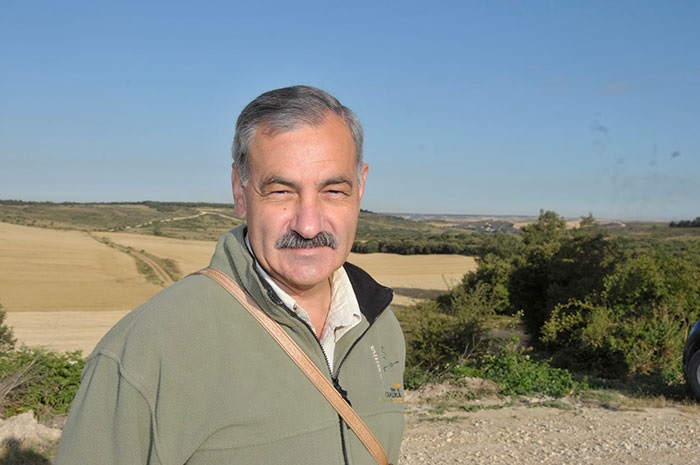- Face to face
- 13 de September de 2024
- No Comment
- 7 minutes read
José María Bermúdez de Castro: ” The quality of education in Spain does not meet the standards required in other European countries”

FACE TO FACE WITH
José María Bermúdez de Castro Risueño, Paleoanthropologist
José María Bermúdez de Castro: ” The quality of education in Spain does not meet the standards required in other European countries”

In light of the upcoming centenary of the renowned Spanish paleontologist Emiliano Aguirre, it is essential to interview someone who both knew and collaborated with him. Today’s ‘Face-to-Face’ features José María Bermúdez de Castro, co-director of one of the world’s most significant human fossil sites, Atapuerca. Bermúdez de Castro earned his degree and PhD in Biological Sciences from the Complutense University of Madrid (UCM) in 1977 and 1985, respectively. Following several pre- and postdoctoral fellowships, he served as an Associate Professor in UCM’s Department of Paleontology from 1988 to 1990.
In 1991, he embarked on a scientific career at the Spanish National Research Council (CSIC) at the National Museum of Natural Sciences, where he held positions as Tenured Scientist, Research Scientist, and Research Professor. In 2004, he played a key role in founding the National Centre for Research on Human Evolution (CENIEH) in Burgos -Spain-, which he directed until 2012, concluding his formal career there. He remains an ad-honorem member of the institution and has held honorary appointments at University College London, in addition to receiving an honorary doctorate from the University of Burgos. Since 2021, he has been a full member of the Royal Spanish Academy.
How did you meet Emiliano Aguirre?
I met Emiliano Aguirre in 1979 during his visit to the Department of Paleontology at the Complutense University of Madrid. At the time, he was involved in the study of a mummified body exhumed from the Basilica of Nuestra Señora de la Asunción in Colmenar Viejo, Madrid, while I was working on my undergraduate thesis. My supervisor, Dr. Pilar Julia Pérez, who had been one of his doctoral students, introduced us. I was immediately struck by his appearance—tall and slender, with black hair and beard, and a deep, resonant voice. He exuded authority, yet was incredibly courteous and approachable. Little did I know that in just a few years Emiliano would become my mentor for almost a decade, without overshadowing the pivotal role my thesis supervisor had played.
Can you describe him in three adjectives?
Courageous, brilliant, and approachable.
What impact do you think Dr. Aguirre’s work had on science and the transmission of knowledge in Spain?
Emiliano was one of the few Spanish scientists and scholars who dared to take decisive steps in the international arena at a time when both science and society in Spain were facing significant challenges. His intellectual curiosity led him to explore several disciplines related to geology and paleontology, and he took the daring step of supervising dozens of doctoral theses across a wide range of topics. Where there had once been a barren intellectual landscape, Emiliano cultivated a flourishing garden, enriched by his contributions and those of his numerous doctoral students. Alongside a select group of scholars, he became a key figure in inspiring the scientific development of several generations.
“Emiliano was one of the few Spanish scientists and scholars who dared to take decisive steps on the international stage”
Could you explain the details of your latest professional project related to Emiliano Aguirre’s legacy?
Emiliano brought me into his excavation and research project at the Atapuerca sites in 1982, while I was still completing my doctoral thesis. I balanced my thesis work with various studies he assigned me, as well as the excavation work. In 1985, after defending my thesis, I fully committed myself to the Atapuerca project, assisting with the planning and logistics of subsequent research proposals submitted to the Ministry of Science at the time, managing excavation budgets, and more.
What positive connections would you draw between your professional projects and the education you received from him?
It goes without saying that my career after Emiliano’s retirement in 1991 was greatly shaped by his teachings, which were numerous and priceless. For instance, although he wasn’t my thesis supervisor, Emiliano read my entire manuscript — handwritten in pencil, as we didn’t have computers back then—and provided all sorts of advice on how to improve it.
The current educational system is quite different from the one you experienced. If you had gone through today’s system, do you think your professional skills would have improved or worsened?
I believe they would have improved significantly. I’m old enough to say that the education we received in Spain during the 1950s and 1960s was highly inadequate.
What do you think Emiliano Aguirre would think of today’s educational system?
I imagine his views wouldn’t differ much from mine.
Given your professional journey, how do you think the transmission of scientific knowledge in our secondary schools should be improved? And if there are failures, where do you think they lie?
I believe that most primary and secondary school teachers lack a fundamental grounding in science. The quality of education in Spain falls short of the standards upheld in other European countries. Considering that the education of our children is shaped by the current system, it’s crucial that teachers receive more rigorous training, both in pedagogy and scientific methodology. Great teachers elevate the learning experience of their students. Naturally, the teaching profession should also be held in higher social and economic esteem.
“It’s crucial that teachers receive more rigorous training, both in pedagogy and scientific methodology”
From a utopian perspective, how do you see the future of Spanish science?
Spanish science has made remarkable progress since I began my career in 1979, but it still requires a significant push to reach the level of countries like Germany or the UK, to name two nearby European examples. The dominance of English as the language of science is a battle that has long been lost due to historical factors, but that should not be used as an excuse.
What would you say to Emiliano if you had him here today?
We would continue the fascinating conversations we used to have about the latest findings and discoveries and likely delve into many other scientific and contemporary topics as well. With the experience I’ve gained over the years, the dialogue would now be more balanced. Back then, I mostly listened, as was fitting for someone who was still in the process of learning.
Source: educational EVIDENCE
Rights: Creative Commons


